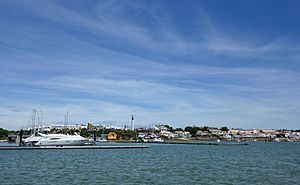El Rompido facts for kids
Quick facts for kids
El Rompido
|
|
|---|---|

El Rompido seen from the Río Piedras
|
|
| Country | Spain |
| Autonomous community | Andalusia |
| Province | Huelva |
| Comarca | Costa Occidental |
| Population
(2017)
|
|
| • Total | 1,832 |
| Time zone | UTC+1 (CET) |
| • Summer (DST) | UTC+2 (CEST) |
El Rompido is a charming coastal village in southern Spain. It's part of the Cartaya municipality in the Huelva province of Andalusia. This village sits right where the Río Piedras river meets the sea. About 1,800 people live here, and it's just 8 kilometers south of Cartaya.
Contents
A Look Back in Time
Ancient Beginnings
People have lived in the El Rompido area for a very long time! Scientists have found tools made of quartzite that are thousands of years old. These tools suggest that people were living here during the Paleolithic era, which was the Old Stone Age.
Roman Times and Beyond
Later, during the time of the Roman Empire, there are signs that El Rompido was used as a fishing village. This makes sense because it's right by the coast and a river. However, experts haven't found much evidence of people living here during the long period when Islamic cultures were present in Spain (from 711 to 1614).
The Rise of Tourism
El Rompido was officially founded in the 16th century. For a long time, fishing was a very important part of life here. But starting in the 1960s, tourism slowly began to grow. In recent years, especially since 2010, tourism has become the main industry. Many visitors now come to enjoy the beautiful coast.
Nature and Fun in El Rompido
Natural Beauty and Wildlife
El Rompido is home to a special place called the Marismas del Río y La flecha-de Nueva Umbria Natural Area. This area is a protected reserve in the marshlands of the Río Piedras. It was given special protection in 1989 to keep its natural beauty safe.
This reserve is a great spot for nature lovers! It's filled with many different kinds of flora (plants) and fauna (animals). You can find various species that thrive in this unique wetland environment.
Things to Do and See
Because tourism is so important, El Rompido has many places for visitors to stay, like hotels. There's also a town center where you can find shops and restaurants. If you enjoy sports, you'll be happy to know there are two golf courses nearby.
El Rompido is located in Andalusia, a beautiful region of Spain. Other towns close by include Cartaya, Lepe, Punta Umbría, and Ayamonte.
Fishing Traditions
Even though tourism is big now, fishing is still a part of El Rompido's history and culture. The village is right next to a sandy spit of land called "Arrow of El Rompido," separated by the Río Piedras. For a long time, fishing was the most important way people made a living. You can still see fishing boats docked on the beach today. Fishermen here often catch flatfish and shrimp.
In the past, a special way of catching tuna called Almadraba fishing also brought many workers, including people from Portugal, to the area.
Local Celebrations
One of the most exciting times in El Rompido is the last weekend of July. That's when the village celebrates the festival of the Virgen del Carmen. This is a common festival in southern Spain, honoring the patron saint of sailors.
In the 1980s and 1990s, this festival was very popular. Sometimes, more than 3,000 people would come to join the celebrations! While the number of attendees has changed a bit since then, it's still a lively and important event for the community.
See also
 In Spanish: El Rompido para niños
In Spanish: El Rompido para niños


